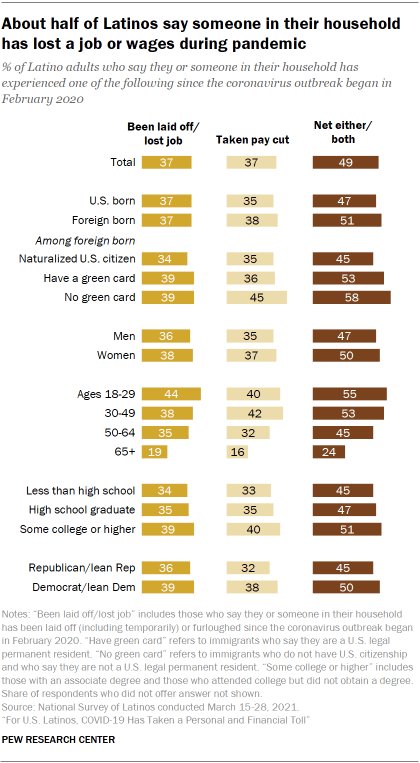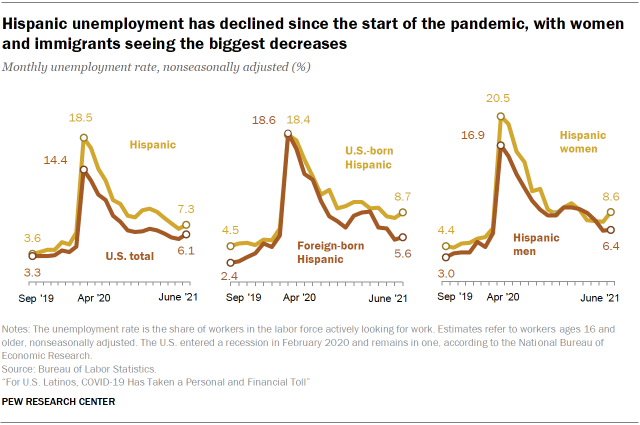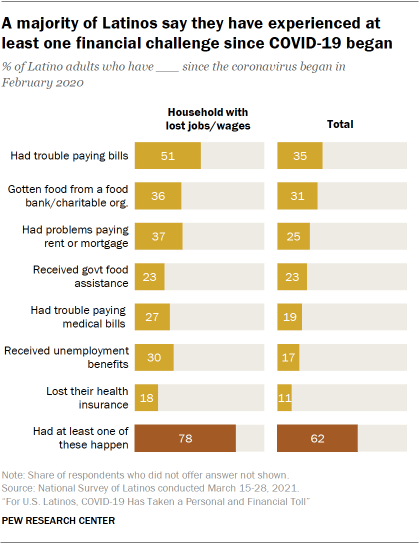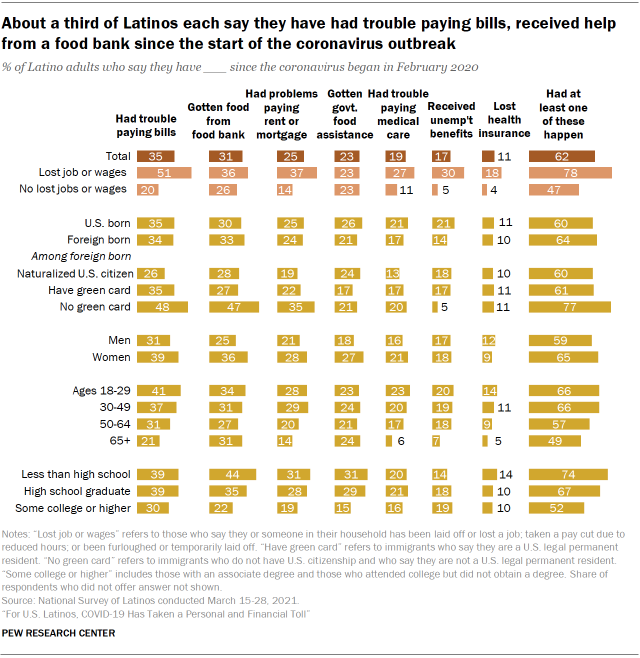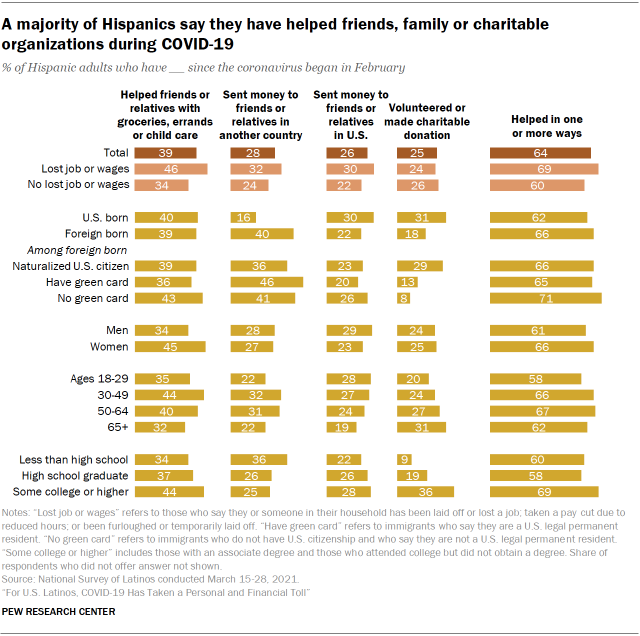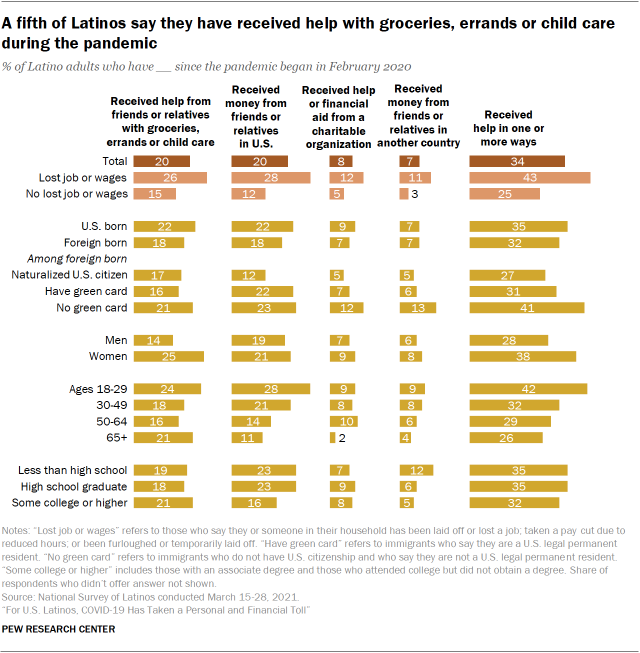Unemployment rates among Latinos surged in the months after the coronavirus pandemic started, and pay cuts buffeted many Latinos who still had a job. This has left some Latinos struggling to pay bills, afford groceries and cover medical costs. At the same time, Latinos have leaned on family and friends during the pandemic, with substantial shares saying they have either lent a hand or received help with tasks like groceries or child care and that they have given or received financial assistance.
Hispanic immigrants without a green card hit especially hard by lost jobs and wages
Overall, about half of Hispanic adults (49%) say they or someone in their household has experienced a job loss or layoff (including a furlough or temporary layoff) or a cut in pay due to reduced hours or demand for their work since the coronavirus outbreak began in February 2020. Among all U.S. adults, 44% said the same in a January 2021 survey.
Latinos born in the U.S. and outside the country report similar levels of job and wage losses in their households during the pandemic, though differences exist among immigrants by legal status. Nearly six-in-ten Latino immigrants without a green card (58%) say they or someone in their household has lost a job or taken a pay cut since the start of the outbreak, a higher share than among Latino immigrants who are U.S. citizens (45%) and a higher share than among those born in the U.S. (47%). Meanwhile, roughly half (53%) of Latino immigrants with a green card say this.
Only about a quarter of Latinos ages 65 and older (24%) say they or someone in their household has lost a job or taken a pay cut since the start of the outbreak, a far lower share than among younger Latinos. However, a majority of Latinos 65 and older say they have not been employed since the start of the outbreak.
Hispanic unemployment rate is improved, but remains above pre-pandemic lows
The unemployment rate among Hispanics stood at 7.3% in June, down significantly since the start of the coronavirus outbreak.7 The Hispanic unemployment rate peaked at 18.5% in April 2020, shortly after businesses and schools closed in response to the coronavirus outbreak. Though unemployment has declined since last year, the rate for Hispanics has yet to return to pre-pandemic lows, when it often stayed under 5%.
The U.S. unemployment rate has been lower than that of Hispanics since the start of the pandemic, though this was true even before then. The national rate was 6.1% in June 2021, down from a peak of 14.4% in April 2020. This rate also remains higher than pre-pandemic levels.
Latinos born in the U.S. had an unemployment rate of 8.7% in June 2021, compared with 5.6% among Latino immigrants. In April 2020 – just after the start of the pandemic – these rates peaked at 18.4% and 18.6%, respectively.
In June 2021, Hispanic women had a higher unemployment rate than Hispanic men, 8.6% vs. 6.4%. When unemployment peaked in April 2020, Hispanic women had a rate of 20.5% compared with 16.9% for Hispanic men.
For Latinos, financial challenges during pandemic include trouble affording food, housing and medical services
Since COVID-19 started, two of the most common financial challenges Latinos say they have experienced are trouble paying bills (35%) and having to get food from a food bank or charitable organization (31%). A quarter of Latinos (25%) say they have had problems paying their rent or mortgage and 23% say they have received government food assistance. Other difficulties asked about on the survey include trouble paying for medical care (19%), receiving unemployment benefits (17%) and losing health insurance (11%). Overall, about six-in-ten Latinos (62%) say they have experienced at least one of seven financial challenges asked about in the survey.
Meanwhile, about three-quarters of Latinos (78%) have experienced at least one of these financial challenges among those in households that have had lost jobs or wages since the pandemic started. In these households, about half (51%) say they have had trouble paying bills.
Financial difficulties vary among certain groups of Latinos, with some of the widest differences coming among Latino immigrants by legal status. A significantly higher share of Latino immigrants without a green card reported trouble paying bills when compared with naturalized U.S. citizens (48% vs. 26%). Meanwhile, younger Latinos tend to say they have had financial difficulties more often than those in older age groups. Four-in-ten Latinos ages 18 to 29 (41%) say they have had trouble paying bills, compared with only 21% of Latinos 65 and older.
The shares of Latinos who say they have gotten food from a food bank differed between women and men (36% vs. 25%) and those with less than a high school education and those who have completed some college or more (44% vs. 22%). Variations also appear among Latino immigrants on this measure, with a higher share of those without a green card (47%) than green card holders (27%) or naturalized U.S. citizens (28%) saying they have gotten food from a food bank since the start of the outbreak.
Most Hispanics say they have helped friends or relatives during the pandemic
About four-in-ten Hispanics (39%) say they have helped friends or relatives during the pandemic by delivering groceries, running errands or caring for their children. A higher share of Hispanics say this in households where someone lost a job or wages than in households where this did not happen (46% vs. 34%). Meanwhile, about a quarter of Hispanic adults say they have sent or loaned money to friends or relatives in another country (28%) or in the U.S. (26%) or volunteered or donated money through a charitable organization (25%).
Overall, nearly two-thirds of Latinos (64%) say they have helped or sent money to friends, family or charitable organizations since the start of the outbreak.
Latino immigrants are much more likely than U.S.-born Latinos to say they have sent money to a family member or close friend living in another country (40% vs. 16%). In addition, among Latino immigrants with a close friend or relative in another country who was hospitalized or died due to COVID-19, 47% say they sent money abroad, compared with 37% of those who did not have a close friend or relative living abroad who became severely ill.
Among Latino immigrants, naturalized U.S. citizens (29%) are more likely than those who are not U.S. citizens to say they have volunteered or donated money to a charitable organization, with lower shares of those with a green card (13%) and without a green card (8%) saying this. Latinos with at least some college education (36%) are more likely to say they have volunteered or donated money than those with a high school degree but no college experience (19%) or those who have not finished high school (9%).
Hispanics have received help from family or friends during the pandemic
Lower shares of Latinos say they have received help than say they have given help since the outbreak began in February 2020. One-in-five say they have received help with groceries, errands or child care from friends or relatives (20%) and received money from friends or relatives in the U.S. (20%). Lower shares say they have received help or financial aid from a charitable organization (8%) or received money from friends or relatives in another country (7%). Overall, 34% of Latinos say they have received help in one or more ways since the start of the pandemic. A higher share (43%) of Latinos in households that have lost jobs or wages say so, compared with 25% of Latinos in households that did not lose jobs or wages.
Differences again exist among Latino immigrants by legal status. About one-in-four Latino immigrants with a green card (22%) and without a green card (23%) say they have received money from friends or relatives in the U.S., compared with 12% of naturalized U.S. citizens. Younger Latinos are also more likely to say they have received financial help from friends or relatives. A higher share of Latinos ages 18 to 29 say they have received money (28%) than say this among those ages 30 to 49, 50 to 64, and 65 and older (21%, 14% and 11%).


